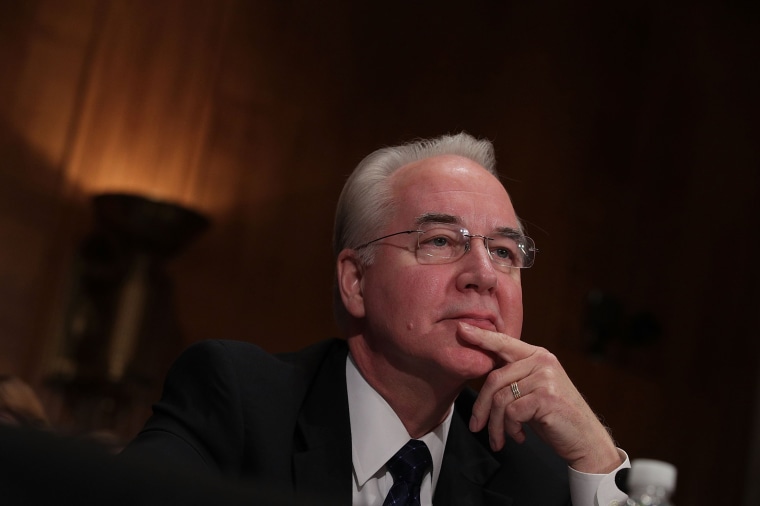WASHINGTON — Health and Human Services Secretary Tom Price on Sunday firmly defended health care legislation passed in the House this week against charges that people who have pre-existing conditions could see their insurance premiums rise under some circumstances.
Asked about the numerous health groups and organizations opposed to the bill during an interview on NBC's "Meet The Press," Price responded, "What I believe they are not recognizing is this is a different and we believe better way" to cover individuals with pre-existing conditions or injuries.
Price later added, “sometimes change can be disconcerting to folks. And that's why I would suggest that that list of groups that you had up earlier, say they now oppose it, the fact of the matter is, they're not focusing on the kinds of things that are going to improve the system.”
The House of Representatives on Thursday narrowly passed their version of the American Health Care Act, a bill that attempts to "repeal and replace" Obamacare, but the bill is expected to go through significant alterations in the Senate.
In the House bill, states could seek waivers so insurers don't have to charge people who see their insurance lapse the same if they have a pre-existing condition.
States that get the waiver would be required to set up some kind of framework — such as a "high-risk pool" — to help out people who see their premiums rise so they can continue to maintain coverage. With the addition of new amendments, about $138 billion is allocated over the next 10 years to help people in these states pay for higher costs, but many insurance analysts predict even that won’t be enough to cover everyone.
Pressed with statistics and his previous comments referring to the fact that older and sicker Americans would pay more, Price claimed, "those who are sicker, who are older, who are poorer — they will get larger subsidies so that they will able to get the kind of coverage they need and for their family."
Price also defended the Trump administration from reports that the White House has proposed cutting the budget at the Office of National Drug Control Policy by 95 percent. As a candidate, Trump had made fighting the opioid epidemic across the nation one of his signature campaign promises.
Price cautioned that "this is a budget that hasn't been completed yet," and that "the president has an absolute commitment to making certain that we fight the opioid crisis."
"Whether it's through an office within the White House or whether it's through a department, an agency of government, I don't think the American people care. What they care about is that we are absolutely addressing this opioid crisis in the most aggressive and effective manner possible."
Since the House passed its health care bill last week, members of Congress and the administration have been taking heat for a celebratory gathering in the White House Rose Garden after the vote — both because the victorious photo-op was seen as premature since the Senate had yet to consider the bill, and for the lack of diversity among the lawmakers present.
Price defended the optics to "Meet The Press" guest host Andrea Mitchell.
"Andrea, come on," he said. "Look at that picture. Congresswoman Diane Black, the chair of the Budget Committee, I was standing next to her, Seema Verma, the administrator of CMS (Center for Medicaid and Medicare Services), I was standing right next to her."
Pressed on only naming a few female names, Price responded, "These are prominent individuals who are leading, who are leading in this area of health care."
The lack of women involved has also become a point of criticism in the Senate's quest to address health care.
Also, on Sunday's "Meet The Press," Sen. Dianne Feinstein, D-Calif., pointed to the working group of Senate Republicans trying to write their own measure — "13 white men, when you have five Republican women who are excluded," she said.
“It’s all male, and women’s health is a big part of this and women are a majority of the population and their health interests deserve to be contemplated in any reform," she added.
As the "repeal and replace" debate moves to over Senate, Sen. Roy Blunt, R-Mo., said on "Meet The Press" that the House bill will not be "not dead on arrival," but they will also not be "taking the House bill and bringing it immediately on the floor," instead looking at some of the House efforts carefully and then incorporating what the Senate wants to do. "You know, this is the way legislation used to be passed."
"From the House’s perspective, they added a few things late, but this is not a new issue. The Senate is going to have to have the kind of score they need to move this forward," Blunt added, noting the upper chamber will need a final score from the Congressional Budget Office before passing its own health care measure.
Sen. Feinstein said Democrats would be open to changes to Obamacare without dismantling the law, worrying about "a whole atmosphere of of unpredictability."
"What my position is and I believe this is the Democratic position: Don’t repeal Obamcare," she said. "Take those sections, like the individual market, which has some problems in it, and deal with it and fix those sections, and it can be done. I’m really very worried that in the rush to judgement we create a major health care problem for people.”

